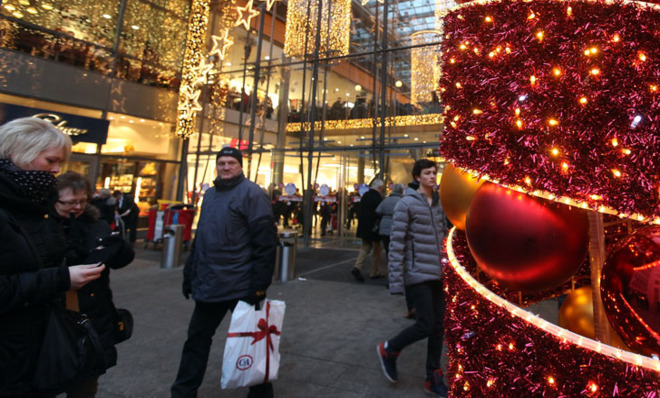How the government shutdown could ruin Christmas
The holiday season won't be so merry for U.S. retailers, who expect dismal sales

A free daily email with the biggest news stories of the day – and the best features from TheWeek.com
You are now subscribed
Your newsletter sign-up was successful
When the government shutdown ended, Standard & Poor's estimated that it cost the United States $24 billion in lost government services, tourism dollars, and federal contractor wages.
The damage, however, didn't stop there. New data paints a pretty grim picture for the upcoming holiday season as well.
The first piece of coal in the U.S. economy's stocking: A dramatic drop in consumer confidence. In September, before the shutdown, the Conference Board's widely cited consumer confidence index stood at 80.2. Today it's at 71.2.
The Week
Escape your echo chamber. Get the facts behind the news, plus analysis from multiple perspectives.

Sign up for The Week's Free Newsletters
From our morning news briefing to a weekly Good News Newsletter, get the best of The Week delivered directly to your inbox.
From our morning news briefing to a weekly Good News Newsletter, get the best of The Week delivered directly to your inbox.
The timing of the drop-off isn't a coincidence, writes Conference Board economist Lynn Franco. And the fact that the government is only funded through Jan. 15, 2014, doesn't help:
Similar declines in confidence were experienced during the payroll tax hike earlier this year, the fiscal cliff discussions in late 2012, and the government shutdown in 1995/1996. However, given the temporary nature of the current resolution, confidence is likely to remain volatile for the next several months. [Conference Board]
When consumers don't feel like the economy is going well, they traditionally tighten their purse strings, a bad sign for retailers who can ring up anywhere from 20 to 40 percent of their annual sales during the holidays.
It gets worse. This also happens to be the shortest holiday season since 2003 — meaning retailers only have four weekends between Thanksgiving and Christmas, compared to five.
That could explain why small businesses are feeling just as pessimistic as consumers. A new post-shutdown survey shows that only 13 percent of small-business owners feel optimistic about the upcoming holiday season, with 43 percent saying they expect sales to be down from last year, according to The Washington Post. Last month, 30 percent of small-business owners felt optimistic, and only 21 percent expected sales to be down.
A free daily email with the biggest news stories of the day – and the best features from TheWeek.com
Their fears are not unfounded. Foot traffic at stores was down 7.1 to 7.5 percent during the 16 days of the government shutdown, reports TIME, with brick-and-mortar retailers in Washington, D.C., seeing a decline of 11.4 percent.
There is a silver lining, however, at least for thrifty consumers. Retailers are expected to extend Black Friday sales before and long after Thanksgiving, Dave Cheatham, managing principal for the Velocity Retail Group, tells NBC News. And online shoppers could fare even better.
"The internet is just going to be in a free fall," Cheatham said. "Free shipping, price matching — whatever it takes to keep that consumer."
So yes, you can thank Washington dysfunction when you buy a cheap flat-screen TV online in December. But in the long run, poor holiday sales could ultimately slow down the country's already anemic job growth. That is not exactly the gift U.S. consumers were hoping for.
Keith Wagstaff is a staff writer at TheWeek.com covering politics and current events. He has previously written for such publications as TIME, Details, VICE, and the Village Voice.
-
 The Week Unwrapped: Do the Freemasons have too much sway in the police force?
The Week Unwrapped: Do the Freemasons have too much sway in the police force?Podcast Plus, what does the growing popularity of prediction markets mean for the future? And why are UK film and TV workers struggling?
-
 Properties of the week: pretty thatched cottages
Properties of the week: pretty thatched cottagesThe Week Recommends Featuring homes in West Sussex, Dorset and Suffolk
-
 The week’s best photos
The week’s best photosIn Pictures An explosive meal, a carnival of joy, and more